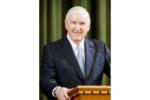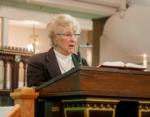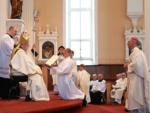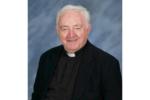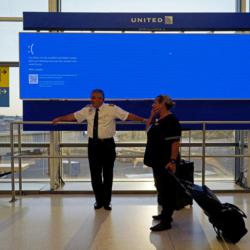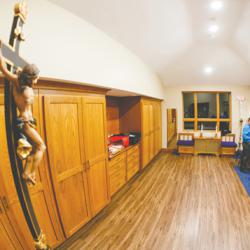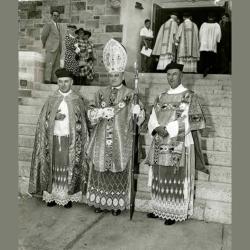Catholic Community Fund highlights social service agencies
BOSTON -- Historically, the Catholic Community Fund (CCF) has been a vehicle for donors to make planned gifts to the archdiocese's parishes, schools, and other ministries. Now, it is refocusing its efforts on fundraising, connecting different Catholic organizations, and showcasing the work of social service agencies.
As part of that effort, the CCF hosted a meeting at the Boston Harbor Hotel on Oct. 5 to give archdiocesan-affiliated agencies an opportunity to meet each other and share information about their services.
Gavan Mooney, who began as president of the CCF a year ago, gave opening remarks at the meeting, which was meant to be a networking opportunity for the various groups represented. Members of the CCF, the Catholic Health Foundation, the Planning Office for Urban Affairs, St. Mary's Center for Women and Children, and Catholic Charities Boston were all present.
"Our hope is that we can do more of these convenings where we're showcasing the amazing work of the different arms of the Catholic Church, and we can come together as a group like this and collaborate and partner and share best practices and ideas, so we can essentially solve more problems," Mooney said.
Father Bryan Hehir, archdiocesan secretary of social services, set the tone for gathering by addressing the "why" and "how" of social service work, since each agency would later answer the question of "what" they do.
He pointed to the Old Testament prophets, whom he called "the moral conscience of the community of Israel." They questioned circumstances like workers' wages, how land was distributed, and how much inequality existed in their society.
"The prophets asked structural questions about how a community lived. And those voices echo throughout the ages," Father Hehir said.
He pointed out that the prophets were always concerned about the welfare of women, children, and immigrants, the three groups that the Congressional Budget Office says are still the most vulnerable today.
Father Hehir said that each of the organizations present has "a religious foundation which becomes a moral mandate."
"A moral mandate is a secular term rooted in a religious idea. But the moral mandate is what guides these agencies, because we serve everybody. We don't ask if you're hungry and Catholic, just if you're hungry. And so the moral mandate becomes the central question any society must face: how do you protect and enhance the dignity of the human person?" he said.
Lynne Sullivan, executive director of CCF, introduced the three agencies giving presentations, which each echoed Father Hehir's call for partnership and collaboration.
The first group was the Planning Office for Urban Affairs (POUA), represented by President Bill Grogan and Communications and Fundraising Manager Lois Alksninis. The POUA's mission is to develop high-quality and affordable housing in order to build "inclusive and vibrant" communities.
"We believe that housing is a human right, and it's our moral obligation to ensure that everyone has a roof over their heads, which is made even more evident during the current pandemic," Alksninis said.
Since its founding in 1969, the POUA has completed over 3,000 units of affordable and mixed-income housing, including housing for senior citizens and the formerly homeless. One of their most recent projects has been Drexel Village, developed in collaboration with St. Katharine Drexel Parish in Roxbury.
"It takes commitment, patience, persistence, and tenacity to ultimately deliver the housing that we're trying to do," Grogan said.
Representing St. Mary's Center for Women and Children, President Alexis Steel and Director of Development Nora Lehan described the wraparound services they provide to break cycles of multi-generational poverty and homelessness.
Their own services include family housing, behavioral health services, and case management to help families navigate community resources. Their strategic partnerships with other organizations enable them to provide healthcare, affordable daycare, and workforce development.
"The reality is that we need to partner to create critical change," Steel said.
The final presentation came from Catholic Charities Boston, represented by CEO Kevin MacKenzie, Chief Operation Officer Kelley Tuthill, and Vice President of Advancement David Whalen. Catholic Charities has 23 locations across the archdiocese, with five regional hubs located in Boston, Dorchester, Lynn, Brockton, and Lowell.
Tuthill gave an overview of the four core services Catholic Charities provides: basic needs, including food security, living assistance, behavioral health, and shelters; refugee and immigrant services; family and youth services; and adult education and workforce development.
"Essentially, we serve as society's safety net for the most vulnerable in the communities we serve," MacKenzie said.
They also shared a video about Catholic Charities' response to the evacuation of Afghanistan, which involved partnering with Combined Jewish Philanthropies and equipping parishes to welcome Afghan refugees arriving in the U.S.
The presentations were followed by an open discussion, which covered such questions as the role of the private sector, the role of parishes, and how to raise awareness of different archdiocese-affiliated funds. Many individuals in attendance lingered afterwards to talk and exchange contact information with the different agencies represented.
In a comment to The Pilot after the meeting, Mooney said one of the CCF's goals is "to elevate and build awareness about the impact and work of Catholic organizations," and that the three agencies represented "are clearly providing life changing services to many."
"It was great to be able to showcase their work. Most people don't realize the scale of what these agencies do. We need to change that narrative," Mooney said.





